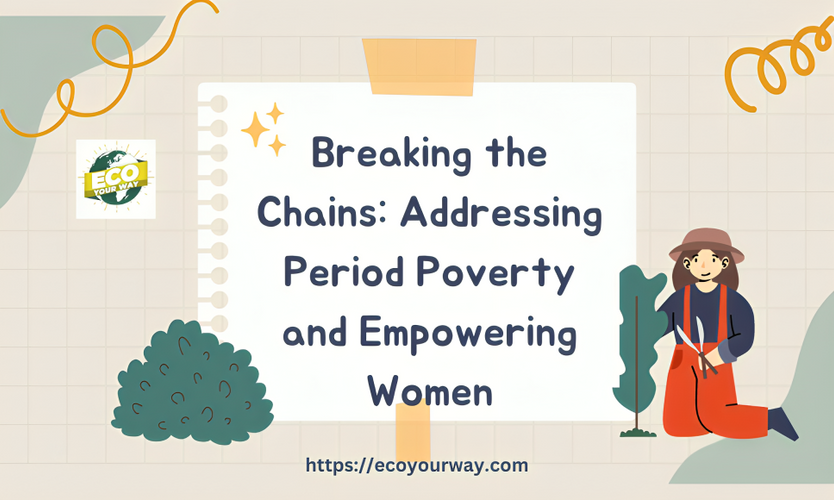Breaking the Chains_ Addressing Period Poverty and Empowering Women
Dec 25th 2023
In the realm of women's health and societal challenges, period poverty remains an alarming and prevalent issue. We, as advocates for change and empowerment, are here to shed light on this critical matter that affects countless women around the globe.
Understanding Period Poverty
Period poverty, a term that encompasses the lack of access to menstrual hygiene products, education, and adequate sanitation facilities, is a grave concern that disproportionately affects women from various socio-economic backgrounds.
The implications of this issue go beyond the physical inconveniences; they extend to emotional and psychological well-being, hindering women's ability to engage fully in daily life.
The Scope of the Problem
Economic Disparities

In a world that boasts progress, it is disheartening to acknowledge that many women face financial barriers when it comes to managing their menstrual health. The high costs of sanitary products, coupled with insufficient access to resources, force women to compromise their well-being due to economic constraints.
Educational Implications
Period poverty is not just a financial hurdle; it also disrupts educational pursuits. Many young girls miss school days due to the unavailability of menstrual products, perpetuating a cycle of inequality. Lack of awareness and education on menstrual hygiene further exacerbates the issue, creating a ripple effect that affects generations.
Bridging the Gap_ Solutions and Initiatives
Promoting Access to Affordable Products
As advocates committed to eradicating period poverty, we believe in actionable solutions. One key aspect is promoting the availability of affordable and sustainable menstrual products. By collaborating with manufacturers and policymakers, we can ensure that cost-effective options are accessible to women from all walks of life.
Educational Campaigns
To break the stigma surrounding menstruation, we must invest in comprehensive educational campaigns. These initiatives should focus on dispelling myths, normalizing conversations about menstruation, and providing essential information on hygiene practices. Empowered with knowledge, women can navigate their menstrual health with confidence.
The Role of Government and NGOs
Policy Advocacy
Government intervention is crucial in addressing period poverty. We urge policymakers to prioritize the issue by implementing policies that make menstrual products more affordable and accessible. By doing so, governments can contribute significantly to dismantling the barriers that perpetuate period poverty.
NGO Collaborations

Non-governmental organizations play a pivotal role in driving change. Collaborative efforts between NGOs, businesses, and communities can lead to sustainable solutions. Through initiatives such as donation drives, educational programs, and community outreach, we can create a collective impact that transcends borders.
Empowering Women_ A Collective Responsibility
Community Support
Beyond governmental and organizational efforts, the strength of communities is indispensable. We encourage communities to come together, fostering an environment where women feel supported and empowered. From local initiatives to global movements, every contribution counts in the fight against period poverty.
Corporate Social Responsibility
Businesses, too, hold a responsibility to contribute to societal well-being. Corporate social responsibility programs can address period poverty by providing resources, education, and support to women in need. By aligning business goals with social impact, companies can actively participate in creating positive change.
Conclusion Of Addressing Period Poverty

In conclusion, period poverty is a multifaceted issue that demands collective action. By addressing economic disparities, promoting education, and advocating for policy changes, we can create a world where no woman is hindered by the lack of access to menstrual hygiene. Let us stand united in breaking the chains of period poverty and empowering women worldwide.
Pros Of Addressing Period Poverty_
1. Enhanced Women's Well-being:
- Pro: The primary benefit of ending period poverty is the improved well-being of women. Access to menstrual hygiene products ensures that women can manage their periods with dignity and comfort.
2. Educational Empowerment_
- Pro: By addressing period poverty, we contribute to keeping girls in school. Increased access to menstrual products means fewer missed school days, promoting educational empowerment for girls.
3. Reduced Stigma and Shame_
- Pro: Ending period poverty helps break the stigma associated with menstruation. Open conversations and initiatives reduce shame, fostering a more inclusive and supportive society.
4. Healthier Communities_
- Pro: Improved access to menstrual hygiene contributes to overall community health. It reduces the risk of infections and complications associated with inadequate menstrual care.
5. Gender Equality_
- Pro: Period poverty is a gender-specific issue. Addressing it is a step towards achieving gender equality, ensuring that women have the same opportunities as men without being hindered by a natural biological process.
Cons Of Addressing Period Poverty_
1. Financial Implications_
- Con: Implementing initiatives to end period poverty requires financial resources. The cost of providing free or subsidized menstrual products can strain budgets, posing a challenge for governments and organizations.
2. Cultural Sensitivities_
- Con: Cultural taboos and sensitivities surrounding menstruation may hinder the acceptance and success of initiatives. Overcoming deep-rooted beliefs requires careful and culturally sensitive approaches.
3. Logistical Challenges_
- Con: Ensuring widespread availability of menstrual products in remote or underserved areas poses logistical challenges. Infrastructure and distribution networks need to be established to reach every corner.
4. Policy Implementation_
- Con: While advocating for policy changes is essential, the implementation of these policies can be slow and challenging. Bureaucratic hurdles may impede the swift execution of plans.
5. Resistance to Change_
- Con: Societal norms and resistance to change can impede progress. Convincing communities, businesses, and individuals to embrace initiatives may face opposition rooted in traditional beliefs.
Certainly, here are 10 frequently asked questions (FAQs) about "end period poverty":
- Q: What is period poverty?
- A: Period poverty refers to the lack of access to menstrual hygiene products, education, and sanitation facilities, often due to economic constraints, leading to challenges in managing menstrual health.
- Q: Why is ending period poverty important?
- A: Ending period poverty is crucial for promoting the well-being of women and girls. It ensures they have dignified access to necessary menstrual products, contributes to educational empowerment, and breaks societal stigmas.
- Q: How does period poverty affect education?
- A: Period poverty can lead to missed school days for girls who lack access to menstrual products. This negatively impacts their education and perpetuates a cycle of inequality.
- Q: What initiatives are in place to address period poverty globally?
- A: Various initiatives involve providing affordable menstrual products, implementing educational campaigns, advocating for policy changes, and collaborating with governments and NGOs to address period poverty on a global scale.
- Q: How can individuals contribute to ending period poverty?
- A: Individuals can contribute by supporting organizations that work towards ending period poverty, participating in donation drives, advocating for policy changes, and fostering open conversations to reduce menstrual stigma.
- Q: Are there cultural challenges in addressing period poverty?
- A: Yes, cultural taboos and sensitivities surrounding menstruation can pose challenges. Overcoming these requires culturally sensitive approaches and community engagement to shift perceptions.
- Q: What role do governments play in ending period poverty?
- A: Governments play a vital role by implementing policies that make menstrual products more affordable and accessible. Advocacy for legislative changes and budget allocations is essential for systemic impact.
- Q: How can businesses contribute to ending period poverty?
- A: Businesses can contribute through corporate social responsibility (CSR) programs, supporting initiatives financially, and providing resources or facilities to promote menstrual health in the workplace.
- Q: What challenges exist in implementing initiatives to end period poverty?
- A: Challenges include financial implications, logistical hurdles in distribution, resistance to change rooted in societal norms, and the need for effective policy implementation.
- Q: Is period poverty only a women's issue?
- A: While it predominantly affects women, period poverty is a societal issue. Addressing it requires collective efforts from individuals, businesses, communities, and governments to create lasting change.

